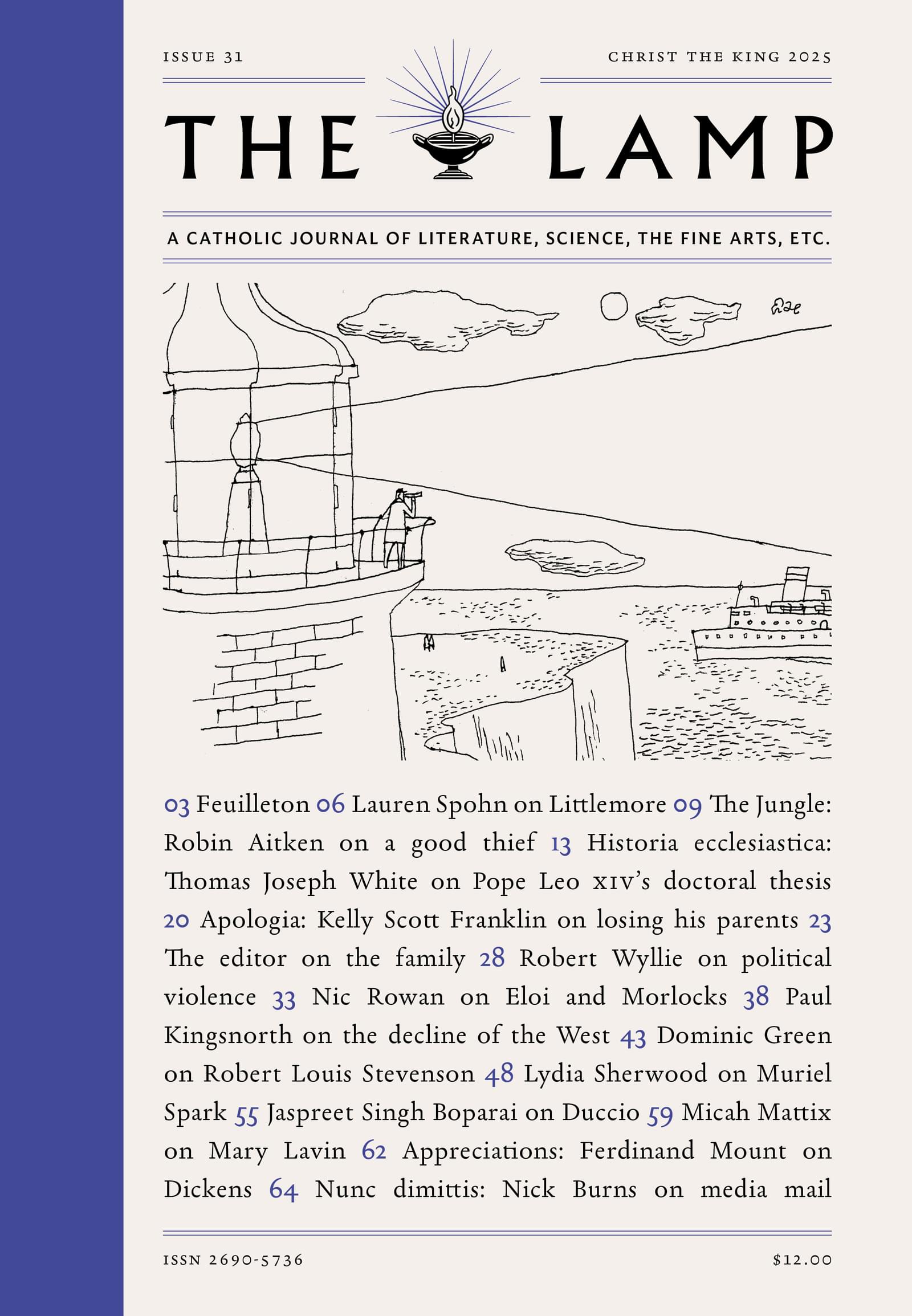Correspondence
I noted with interest the dialogue between Mr. Chessman and Messrs. Borman and Walther in the Assumption 2020 issue of The Lamp. Mr. Chessman believes that Triumph “was virtually the polar opposite of The Lamp both in style and substance” because L. Brent Bozell, Jr., and his confessional tribe “confronted directly the major issues of state and Church.” Like Borman and Walther, I disagree. The story of Triumph is complex, and to reduce it to a mere organ of contrarianism is to misunderstand Bozell’s goal in starting the monthly.
The Lamp shares traits with Triumph: “Feuilleton” resembles Triumph’s “Present Imperfect” and “Non-Imprimatur,” both magazines review books of all stripes, and each engaged with both the timeless and the timely—witness, for example, Bozell, Marshner, and Wilhelmsen’s adoption of McLuhan and rejection of Teilhard de Chardin in continuity with Andrew Kuiper’s exploration of Maritain (Christ the King 2020, p.23) and Angela Nagle’s critique of Sophie Lewis (Christ the King 2020, p.15). Triumph published essays from distinguished writers regardless of partisan affiliation, e.g., Michael Novak (still in his Marxist years) appearing alongside the great Thomist Josef Pieper in November 1971. It presumed a literate and good-humored Catholic readership and sought diligently to cultivate the next generation—the Society of the Christian Commonwealth was intimately involved in the creation of Christendom College and Thomas Aquinas College, and Wilhelmsen (and his daughter) taught at the University of Dallas for years. One could find a eulogy for Ezra Pound and a conversation with Anthony Burgess next to an exposition of the latest papal encyclical—a rare occurrence, indeed.
Triumph’s failure may be instructive for The Lamp. Bozell’s monthly was, firstly, unable to sustain itself financially—donor money ran out and they hemorrhaged subscribers from their 1969 peak of twenty eight thousand. Some of their positions (particularly contra the Vietnam War and the Pentagon’s nuclear policy of counter-value), while manifestly correct, alienated their mostly conservative subscriber base. Second, Triumph was sustained largely on the energies of Bozell, and his immense workload was hindered by debilitating bouts with alcoholism, manic depression, and mild schizophrenia. Though Gary Potter circulated a few additional issues after Bozell’s collapse in 1975, Triumph flamed out into obscurity.
Academic engagement with the magazine has been limited: George Nash devotes a page to explaining what Bozell did after he left National Review, Mark Popowski turned his dissertation on Triumph into a 2012 book, and Daniel Kelly published a biography of Bozell for I.S.I. Press in 2014. Bozell’s greatest legacy may be the pro-life movement—he led the first major protest in front of a D.C. clinic in June 1970. After being arrested, he published a blistering op-ed in the October 14, 1970 New York Times comparing abortion to the Holocaust and condemning the “language of the exchequer” and “masturbatory gratification” that cheapens the life of the unborn child. One wonders what the reaction to such rhetoric in the Times would be today.
I close this letter with some unsolicited advice and encouragement. One big weakness in Triumph was the adulation offered unto Francoist Spain and the Irish Republican Army. As the Psalmist says, put not your trust in princes. Another weakness was their inability to offer a cogent critique of neoliberal economics—“John Paul Maynard Keynes” makes admirable first strides, but more is needed. Finally, Triumph articulated a robust orthodoxy while the Church under Pope Paul VI was in a period of flux; one of their virtues was that they would brook no dissent or heresy, and they deserve credit for being the only major Catholic magazine at the time to welcome Humanae vitae. Your respect for Pope Francis is similar and heartening—I look forward to more on both him and our papa emeritus Benedict XVI. I’m glad The Lamp, in some ways, takes up the “Spirit of Triumph,” a spirit of bonhomie, radicalism, and urbanity. You occupy a unique space in the Catholic world, and I hope to see you endure for many years to come.
Max Bodach
Ave Maria University




